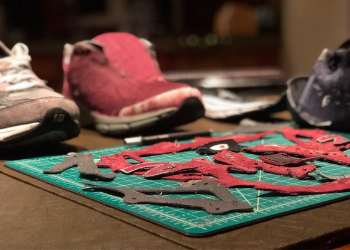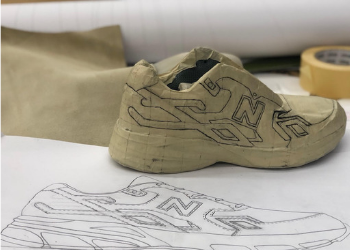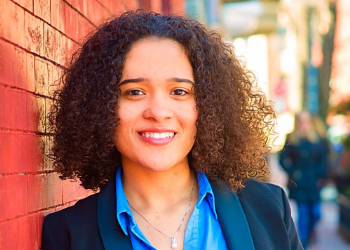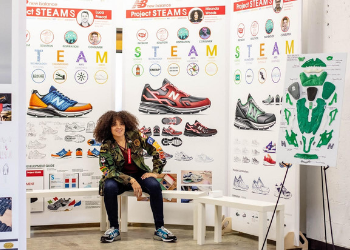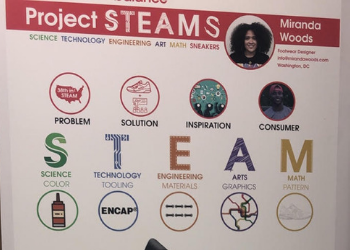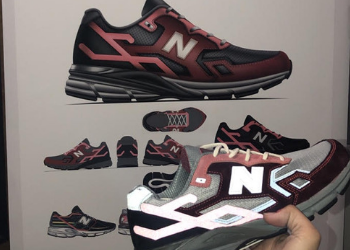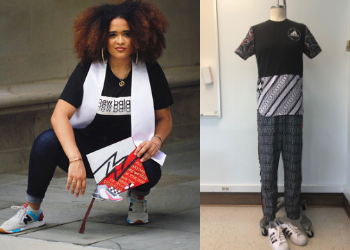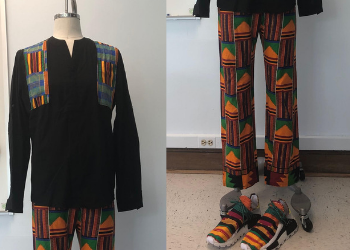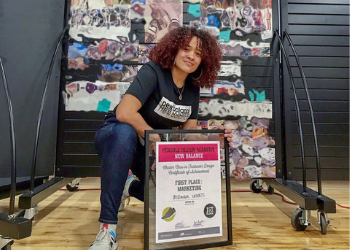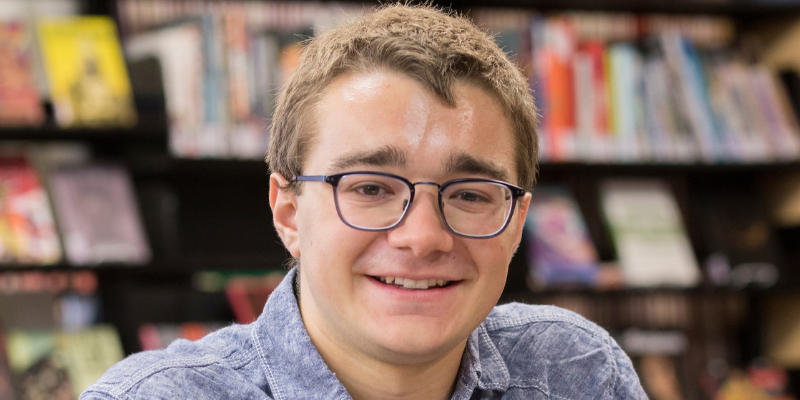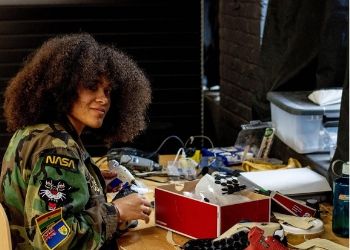
Major Insight Ep 3: How Collecting Sneakers Becomes a Career

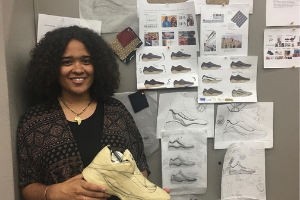
A production of Miami University and the Reframe podcast, Major Insight showcases the stories behind successful college students, their promising new research, and its relevance in our world.
On this episode of Major Insight, Miami student and host Jacob Bruggeman talks to Miranda Woods about how studying abroad in Ghana influenced her designs, why she hopes to introduce more authentic African elements into the American sneaker culture, and much more.
Featured Majors
Architecture
Featured Study Abroad Program
Design-Build in Ghana
Featured Organizations
African Students' Union, Pensole Footwear Design Academy, New Balance, Adidas, Nike, Bleacher Report
Major Insight is a production of Miami University and the Reframe podcast. This is where we showcase successful students, their promising new research, and its relevance in our world.
(MUSIC)
There is more than one way to get your dream job, and Miranda Woods has found some inspired ways to follow hers. As an architecture major and an aspiring sneaker designer, Miranda expresses her creativity with shoes in innovative, unconventional, and even socially conscious ways.
She is also a Miami University Goldman Prize winner, which allowed her to study shoe construction and prototyping at the prestigious Pensole Footwear Academy in Portland, Oregon, where she was named the 2019 New Balance Footwear Brand Design Winner.
And on this episode of Major Insight, Miami student and host Jacob Bruggeman talks to Miranda Woods about how studying abroad in Ghana influenced her designs, why she hopes to introduce more authentic African elements into the American sneaker culture, and much more.
Jacob Bruggeman:
Alright Miranda, welcome to Major Insight podcast of Miami University showcasing student research. So we’re excited to have you today, and talk about your interests in the sneaker world, and in basketball, and your design experiences. So, to start off, could you give us a little bit of an overview of your interests in design and sneakers? Your major in your course of study at Miami University, and maybe how those interests have intertwined and different experiences so far?
Miranda Woods:
Yeah. So I am an architect major and a brand design minor. And I created the brand design minor to sort of help shape my major and what I’ve been learning, more tailored to what I want to do. Because I want to be a sneaker designer. And so, you know, sneakers are just my everything. I’ve just grown up really, really loving and collecting sneakers. And then it turned into customizing shoes, and like restoring old ones. And it got to a point where I just had so many pairs my dad was like, you need to find a way to make this profitable. Otherwise, you're just throwing money away. Like, yes, you see it as a collector's item. But long-term, that's a lot of money you're putting into something that, you know, doesn't help your future.
So I really figured out how to, like, mesh the two between my obsession with sneakers and architecture when I went to Pensole Footwear Design Academy in Portland, Oregon, summer 2017. And I was … it was just a week-long class. But that really just … the shoe I got to design there, it was like a week-long, like, intense competition. And it was all architecture-related. Like, the whole design I made was off the blueprints of this hotel that was around the corner from there. And I just really saw, like, all of the similarities in the design process, and the way that you go about designing a building, and the inspiration behind it and everything else, is very similar to what you would do with sneakers.
So I was like, oh, I can do this. So, I’ve been still like, you know, getting my degree in architecture. But whenever I get the opportunity, I apply it to sneakers. So, I went back to Pensole last semester as, like, a study away and did a whole three-month program there. And just doing sneakers. And I got that applied and used as an architecture studio. So I got credit for it.
Before that, when I went to Ghana for an architecture studio study abroad, I turned it also into a sneaker opportunity for research for the Goldman Fellowship, which you also have.
Jacob Bruggeman:
Yep.
Miranda Woods:
And mine was all about, like, connecting West African culture and fashion to American sneaker culture. And seeing similarities between the designs, and the similarities between, like, the markets within it. So, while I was in Ghana, I got to design a pair of men's, like, dress shoes in my size - so I get to wear them - with the shoemaker there. And really just learned his process of taking apart shoes. He takes used women's boots, leather boots, and strips it all apart, and then uses the leather, with his own patterns, to make shoes. So seeing that really inspired me to, like, take apart shoes and reconnect them with West African culture and design - similar to what he was doing. So, applying textiles and leathers and stuff I got while I was in Ghana.
And that's really just what’s been my studio, like, all year and around. So, I did a little bit while I was at Pensole. And this semester is all I’ve been doing is just everything sneakers. Actually putting them back together with these different designs and ideas I got while I was in Ghana. Researching more on, like, women in design within sneakers. I’ve really just taken the design elements that I learned in architecture here and just ran with it in the direction that I felt like would lead me into a career path.
Jacob Bruggeman:
So we've spoken before, and one of the issues in contemporary fashion is that a lot of brands, different brands, all over, in all different kinds of products, sort of commodified it for an African culture. And maybe pay, like, very little attention to what the actual fabrics are, or they sort of produce a watered down version of what the fabrics are. Could you talk a little bit about what that was for you, when you realized that that was going on the fashion industry, and how you're trying to respond to it in the designs you're doing now, and what you hope to do in the future.
Miranda Woods:
Yeah. So, with sneakers like one of the biggest consumers of most modern sneakers now are black people. And we're living in an era where a lot of black Americans are really trying to connect with their roots, and find ways to connect back with Africa, regardless of the actual connection they may have. Because of growing up in America, and their ancestors being through slavery. So, you know, you see this commodification of it with, like, Nike has every year Black History Month shoes that they put out for their whole basketball line. And it's always some screen-printed, you know, off-brand looking West African design. You just sort of …. Supposed to be Kente that they just like print or paint on the shoes and it's never authentic. This year they actually used fabric for once. It wasn't just painted. But it wasn't authentic. It didn't feel authentic. It didn't look authentic. Especially, a lot of these designs have very specific meanings in the cultures. So, you know, Adidas this year, same thing, they did a Black History Month shoe and it was all white. They got recalled. Like, it's like, why is your black history month shoe all white?
And so, you know, being able to go to Ghana and get these textiles, and get these leathers, and bring them back, and actually apply it to shoes the way that it should be done, and it can be done. And it's not hard to do. Like, you can get these textiles for really cheap over there. You can employ people over there. You could actually, like, create some … and stimulate, like, the economy over there. But they're choosing not to. You know. It's really like … with leather. Even just with leather. Like, Ethiopian leathers are a huge, huge industry. So, you know, it's all feasible and they're just choosing not to. It goes with the designers as well, like, they're not seeking out African designers, or just black designers. Period. And so, they're … the designs reflect it. It doesn't feel authentic.
So being able to illustrate that through this project has been a main inspiration.
But then also, another one was, like, dispelling the myths and the stereotypes that, like, Africa is a resource-less continent, and it has nothing to bring to American culture. Economically and, like, resources. But then also, like, with culture and fashion. There is a lot of fashion and culture influence that's brought here. And people don't realize it. So, being able to, you know, showcase that. It's been really cool.
Jacob Bruggeman:
Yeah. One of the points at which you did showcase it was the African Student Union's Gala. And I was there, and I remember seeing, when people were wearing your shoes, and then just generally the fashion show section of the gala. I mean, it's quite stunning that these fabrics … because these fabrics are just visually incredible. And you as an individual designer are obviously trying to make change. By going into the industry. By doing what you're doing here on campus. What are some large or broader structural changes you could see happening?
Miranda Woods:
The thing I would really like to do is really get, like, black Americans, especially, like, in my hometown of D.C., to start thinking less of like the consumer, and more like the creator of these things. Sneakers, especially, like, I’ll use D.C., for example, like, we love New Balance. We love the 990. And people just buy up the 990. The D.C. area is the biggest domestic consumer for New Balance. And so, it's, you know, it becomes … if we love the shoe that much. If you're collecting shoes that much. You know a lot about those shoes. You can be a designer. You can be a marketer for those shoes. You can be a color material specialist for it. Do graphic design. There's lots you could do within sneakers. And so, trying to teach kids and create, like, creative spaces for kids, and especially black people that, you know, you can get into these things. They're not, you know, something that's so far away and unreachable to be able to do.
And I did a project on that, that was similar to that, which was like teaching kids how you can apply different STEAM aspects. So science, technology, engineering, art, and math that you would normally get taught in school to, like, oh, go be an engineer. Go be, you know, some sort of 3D designer or something like that for something technical. But you can apply that sneakers, and the sneaker design process. So being able to, like, illustrate that on a bigger scale to kids, to young people, that, you know, your parents may say like, oh, creative jobs aren't, you know, really feasible. You're not gonna make a lot of money. So like go be an engineer. Go learn code. You can do those things. That's fine. But, like, you can also apply those things to shoes. Like, those same machines. Those same coding. That same graphic design that you're learning, we can use that in sneakers.
Jacob Bruggeman:
Well, it's …. I mean, you can correct me if I’m wrong. But there's also a lot of money in sneakers. Isn't there?
Miranda Woods:
Yeah.
Jacob Bruggeman:
So I’m sure that the positions actually pay relatively well compared to, you know, an entry-level.
Miranda Woods:
Yeah. They pay pretty well. They're in pretty cool cities. Like, the major hubs. Portland, Oregon, which is really quirky. It's a fun place. You know, L.A., New York. They pay really well. There are a lot of perks because, like, you go to work for Nike. And all of a sudden, who knows. Like, LeBron can be walking through.
Jacob Bruggeman:
Yeah. There's this a celebrity aspect to it. Because it's such an important element of, I think, American culture today. And people pay attention to it. Celebrities in particular. You yourself have a work history with Kawhi Leonard. Not directly as I understand. But you managed a campaign for him. Could you tell us a little bit about that?
Miranda Woods:
Yeah. So the last Pensole project I did was in February to go to New Balance’s headquarters and do a three-week competition. And we … each of the teams were assigned a New Balance athlete, and I was given Kawhi Leonard. And we had to, like, brand him, basically, to New Balance, and create this whole theme and everything around him. So that time, I wasn't directly doing footwear design. I was doing like footwear brand marketing. Like, creative marketing and branding for Kawhi. Branding into the shoe. Branding him to the company. And like, just creating the connections between there.
So it was a lot of fun. I really, really enjoyed it. I was already a fan of Kawhi. Just because he's just super different, and it's just fun. And as a result from doing that project, I won the prize or the competition in there for brand marketing, and was offered a position at New Balance. And it'll be starting in January. So very excited.
Jacob Bruggeman:
Something that you’ll do before then, I understand, is a summer stint with Bleacher Report, which is less design, if I’m correct, and more sort of journalistic reporting and marketing. Right? So, could you tell us a little bit about that?
Miranda Woods:
Yeah. So, I really just been trying to plug into anything and everything sneakers. And I want to be able to be totally, you know, proficient in or above that, in every single aspect of, like, the sneaker design process. So that goes into some of the reporting of it all, and marketing, which I’ve gotten into as a result doing this Kawhi project. So this summer, I’ll be working at Bleacher Report Kicks, and working on their sneakers team, Kicks. And, you know, they have some YouTube shows on sneakers. They have, like, a lot of their social media accounts, they just really follow sneakers and what the players wear in the NBA. What's the latest news within, like, with drops. Special collaborations that companies are doing, and stuff like that.
Jacob Bruggeman:
With different athletes and celebrities.
Miranda Woods:
Yeah. Different athletes and celebrities. They had this cool thing a couple of weeks ago. They did a Game of Thrones Adidas shoe.
Jacob Bruggeman:
Yeah, I think I saw that. I’m sure it sold quite well.
Miranda Woods:
Yeah. Yeah. He wore it. It was a limited. So they only made a couple of them. So he wore it during a playoff game, and then they, like, raffled off a couple other pairs. And they looked really, really cool. So I’m excited to be able to get this opportunity in New York, and really look at, like, sneaker marketing and how you market different things to the consumer from outside of a brand standpoint. Because, you know, they're not directly designing the shoes. So, just sort of really more connecting with the consumer. What the consumer is looking for at this moment. Which will help, you know, influence designs and stuff once I start my job.
Jacob Bruggeman:
To bring it full circle. So we talked about your study abroad in Ghana. The different … the Goldman prize. The Joanna Jackson Goldman Memorial Prize, we should say, which is a substantive award for seniors to do their own research project. And now you have all these sort of opportunities, both in the summer before graduation, and then you have a job lined up for after graduation. How would you say your experience in in the Miami departments you've been in, with the Miami professors that you're close to, and then broader … in a broader sense, in the Miami community, have prepared and shaped you to sort of take advantage of those things?
Miranda Woods:
One thing I really learning from this whole thing, and just college in general, is, like, never take no for an answer. There's always a way. And never think that, you know, just because the opportunity was presented and doesn't seem feasible at the moment, that it's not going to work out. There has always seemed to be a way. Something has always gone my way to allow me to be able to do these things. The department of architecture has been super, super supportive. Just whenever an opportunity arose while I was in school, you know, making sure that: One, if I needed the money for it, they would find at least something to help towards it. And then: Two, you know, allowing me to be able to create my own classes this semester around sneakers. Letting me go all the way to Portland to study sneakers for a whole semester.
Last year, I went to L.A. for NBA all-star weekend. I got to go to this exclusive Adidas event. And it was totally last minute. And I just told one of the professors that I got this and I was trying to figure it out. But it was looking like a lot of money. So I didn't think I would be able to do it. And he got me clear to be able to miss class for two days, and gave me half the money. And I was able to go.
Jacob Bruggeman:
Is that the event you gave your card to Steph Curry?
Miranda Woods:
No that's a different event.
Jacob Bruggeman:
You got to tell us that story as well.
Miranda Woods:
Yeah. Yeah. That … I was at a movie screening of his. He executive produced a movie, and they were showing it at Howard University. And it was right near my house. And so my dad was like, yeah, let's go up there. So, we walked up there. And after the movie, he was just sort of shaking hands and saying hello to people. And he was like up on the stage, and it's like a huge crowd. Like, I pushed my way up to the front, and I handed him my business card. And I told him, I said, you know, I am an aspiring sneaker designer. You've been doing a lot for women recently having, you know, like, a young girl design a shoe. And having your own, like, girls only basketball camps, and stuff like that. You should have a black woman designer on your design team as well. And I really got his attention with that. He's like, yeah, yeah, it makes sense. I respect that.
And so, he took my card. He later followed me on twitter, which is really cool. I’ve been able to connect with a couple designers on his team. So, it's just a good connection I have in my back pocket.
Jacob Bruggeman:
Oh yeah. And at least to have the twitter verified check mark in your followers list. And that, I think, that also fits, I think, with the bold path that you're on right now. And you said, you know, you're not taking no for an answer. And I think marching up to Steph Curry, who is by all means is probably the most … if not the most, you know, one of the maybe top five most well-known basketball players in the United States right now.
Miranda Woods:
In the world.
Jacob Bruggeman:
In the world, definitely. And just be like, look, here's my card. That's quite impressive. And I think that that definitely is part and parcel of the attitude that you've just described of sort of trying to trail blaze for other people in the industry.
So, looking forward, where do you see yourself five years from now, ten years from now? Both maybe in relationship to the broader design community, and then the Miami community? Because I know that you're a very community oriented person.
Miranda Woods:
You know, first couple years I’m … I really want to, you know, just be stacking cash. Be able to do the other things I want. I really want to develop a personal brand, and I like working … being able to work for other companies. Like, I’ve done projects for New Balance and Adidas. But because, like, at heart, at the root of all this, I was, like, a sneaker collector. I wouldn't even say I have one major brand I lean towards, and I feel like that's one thing that's really gonna stick with me once I start working for New Balance in January. Like, I can only wear New Balance, and it's gonna be weird.
Jacob Bruggeman:
Is that a line in the contract essentially?
Miranda Woods:
Yes. You can't wear competitor’s shoes. And competitors gear. So, it's gonna be weird. And I think, you know, one way to look at that is, like, okay, well, how can I become like a freelancer? Like, Virgil Abloh has done work with Nike. And he's not signed to Nike for life. He can go and do the same sort of collaborations with Adidas if he wanted to. And so, you know, being able to develop my personal brand. And, like, my personal touch on sneakers, something that sets me apart from other designers so that I could go and do like these types of collaborations with other companies, and be able to put my mark in certain areas in different places. And then, hopefully, that will be, you know, like, gain enough, like, notoriety and money from that to then be able to put these community things I’ve been talking about in place.
Jacob Bruggeman:
Looking back. If you could give your first year self advice, and then, by extension, you know, other first year designers, thinking along the same lines as you, or black women designers who are coming in and trying to, you know, maybe they're majoring in architecture. Or they are in the minor that you created. Or they're in the fashion major. But who want to break into the industry. What would be the advice you have for them be?
Miranda Woods:
Well, I came in as a mechanical engineering major …
Jacob Bruggeman:
Well, that's probably a whole another podcast.
Miranda Woods:
Yeah, that’s a whole another podcast. I don't know. I was really good at math and science in high school. I really like math. And so, I just thought … I came in thinking, like, oh, I’ll make money, and I was expecting it to be a little more creative. Like, I’ll be designing robots. That's what I thought I was gonna be doing. And it wasn't that. And it was like five hours of calculus every night for homework.
And I was like, I can do this, but this is not what I want to do. I can't sit still for five hours and do calculus. And that's why I switch to architecture. It was more creative. And so, I think one piece of advice I give for first years is, like: One, if it's possible, like, take the time and really find yourself in what you want to do. If you find that, after one year, two years, you're not happy with what you're doing, change directions. Because whatever you're doing right now, that's here for the rest your life. And that's one thing that I’ve been very clear with myself is, like, I will not be happy unless I’m doing something that makes me happy.
I can't be in a, you know, regular nine-to-five. That's not me. So, be open to understanding yourself, and figuring out: Is this really what I want to do? Is it really gonna make me happy for the rest of my life? And if not, changing directions. And if, you know, you find a place where, you know, you can't change directions … like, when I really got into sneakers, you know, everyone in the sneaker realm was telling me you need to study industrial design, or product design, and those aren't offered here. So, you know, even if I wanted to change majors for a second time, I couldn't. And so, being able to really, like, take my major in architecture and tweak it to what I wanted was really, really beneficial. And I know a lot of schools don't do that. So that's one thing to Miami's credit. It's like they were really, really open to me creating what I wanted it to be. And so, figure out ways to make what you have going on for you work. And, like I said, like, just don't take no for an answer. Find a way to make what you want to happen happen.
Jacob Bruggeman:
Well, thank you for coming on the podcast. And we will be sure to follow your … what I’m sure will be an impressive career in design and branding. So thank you very much.
Miranda Woods:
Thank you for having me.
(Music Up)
Announcer:
Miranda Woods is an Architecture major. And after her internship with Bleacher Report this summer, she plans to start her first job after college at New Balance in January.
Major Insight a production of Miami University and the Reframe podcast. If you enjoyed this episode, please share it with a friend. More episodes are free on Apple Podcasts, Sound Cloud, and on Google Play Music.
SHOW NOTES
A production of Miami University and the Reframe podcast, Major Insight showcases the stories behind successful college students, their promising new research, and its relevance in our world.
Miranda Woods is following her dream of designing sneakers in innovative, unconventional, and socially conscious ways. On this episode, she talks about being named the 2019 Pensole x New Balance Co-Op Footwear Brand Design Winner, why she hopes to induce more authentic African America elements into American sneaker culture, and more.
Featured Majors & Minors
Architecture, Brand Design
Featured Study Abroad Program
Design-Build in Ghana
Featured Organizations
African Students' Union, Pensole Footwear Design Academy, New Balance, Adidas, Nike, Bleacher Report
Miranda Woods and Her Designs

